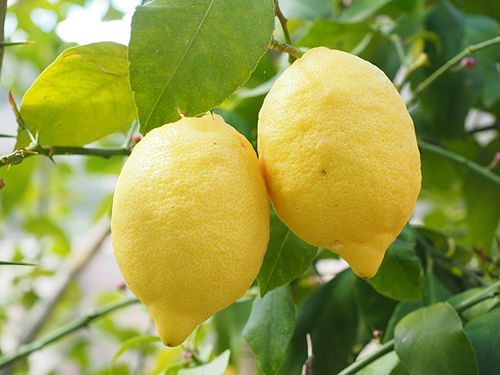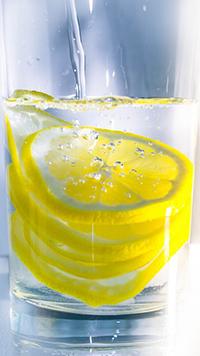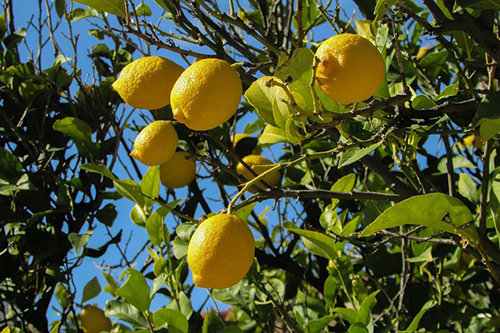Contents
The lemon is a synonym for health. Besides the many health benefits, the fruit increases the saliva glands’ production, making our mouths water. James Cook, the famous 18th-century seaman who discovered Hawaii and New Zealand, made his sailors take some lemons in their baggage. In his time, vitamins had not been discovered; however, his acute seaman instinct made him guess there may be a secret for healing his crew’s scurvy in the lemon.
Captain Cook was right. His sailors endured the harshness of those oceanic journeys with more strength than any other crew, which fell victim to scurvy. That sea dog discovered fantastic places and dominated the oceans thanks to this little fruit. The British Navy also owes its success to the many lemon health benefits.
In 1928, the Hungarian chemist Albert Szent-Gyorgyi isolated ascorbic acid, the substance citrus that owes its anti-scurvy effects, which was named vitamin C. This discovery was awarded the Nobel Prize in 1937. Over the last decades, many other virtues and medicinal lemon health benefits have been discovered besides the anti-scurvy one. However, this article will only mention those having a scientific base that has been experimentally proven.

Lemon Health Benefits and Healing Properties
The LEAVES of the lemon tree are rich in an aromatic essence formed by D-limonene, l-linalool, and other terpenic hydrocarbons in lesser proportions. They are soothing and antispasmodic, and their use is recommended for those suffering from nervousness, insomnia, palpitations, migraine, or asthma. Being also sudorific, they also have a vermifuge effect (to expel parasites from the intestine).
The fruit’s RIND contains 0.5% essential oil, mainly d-limonene, besides coumarins and flavonoids. It has refreshing properties for the digestive system, and it is recommended for those suffering from a lack of appetite, heavy digestion, and poor stomach functioning. Like the leaves, it is also vermifuge and sudorific, and it is successfully used to decrease fever.
The LEMON JUICE contains vitamins B1, B2, and C (50 mg per 100 g), mineral salts (especially those of potassium), trace elements, sugars, mucilages, organic acids (citric, malic, acetic, and formic), and flavonoids (hesperidin). It is said to have many effects; however, this article will mention those which have been scientifically proven.

- Antiscorbutic. Vitamin C is the essential property responsible for lemons’ many health benefits. Though there are vegetables with much higher concentrations of vitamin C, such as the brier hip and the red currant, the lemon’s powerful anti-scurvy effect is due to its balanced composition of organic acids and mineral salts.
Scurvy or scorbutus is caused by a lack of vitamin C (ascorbic acid), which is only found in fresh vegetables. Though severe vitamin C deficiency is rare, it is not unusual to see a minor case among those who follow unbalanced diets or whose diets are poor in vegetables and fresh fruits. - Invigorating. Because of its vitamin, mineral salts, and acid content, lemon stimulates the digestive organs’ activity and revitalizes the whole body. It suits people suffering from dyspepsia, and even though it may seem a contradiction in terms, it also suits persons suffering from stomach acidity. Despite its acidic flavor, the lemon behaves chemically as a buffer and can neutralize the excess of alkalis and acids.
In the case of an upset stomach or indigestion, a popular remedy is to administer the juice of a lemon dissolved into half a glass of water with a teaspoonful of sodium bicarbonate. - Alkalinizant and depurative. The lemon produces an alkalization of the whole body, which suits those people with protein or meat-rich diets, which produce an excess of acid waste, such as uric acid. Turning the pH (the degree of acidity or alkalinity) towards alkalinity in the blood and the urine, the dissolution and the elimination of uric sediments of joints and kidneys are eased. Lemon juice is highly recommended for those suffering from kidney stones, gout, and arthritis and those who want to purify their blood and improve their health.
- Kidney stones dissolve. Lemon juice’s citrates, especially potassium citrate, prevent the formation of kidney stones and ease their dissolution. Scientific experiments have proven this with urate and oxalate stones (the most frequent types).
This property of citrates, combined with the aforementioned alkalinizing action, makes lemon juice a proper medicine for kidney ailments. - Venotonic and capillary protecting. Due to its hesperidin content and a diosmin and other flavonoids, like vitamin P, the lemon reinforces the capillary vessels’ stability and improves venous blood flow. It is helpful in cases of swollen legs, edema, varicose veins, hemorrhoids, thrombosis, and emboli. It is also recommended for people who suffer from high blood pressure.
- Antiseptic. Lemon juice, directly applied to the tonsils or inside the nose using a soaked cotton cloth, makes diphtheria bacilli disappear from people carrying such microorganisms. Dr. Ernst Schneider personally proved this fact, and other experiences followed that demonstrate the antibacterial power of lemon. For example, the cholera epidemic in Venezuela in 1855 was resolved through the massive consumption of lemons by the population.
Locally applied, lemon juice is helpful against tonsilitis (sore throat) and pharyngitis and is equally good as an antiseptic for any skin ulceration and wounds. - Cosmetic. Lemon juice soothes and hydrates the skin, strengthens weak nails, and gives brightness to the hair, besides diminishing dandruff.
It is significant to note that soft drinks that are so-called “lemonades” or that state they are “made of lime” lack medicinal properties and are toxic for health due to their content of carbonic gas, artificial colorings, and aromatizers, sugar, or other flavors. The best way to take advantage of the many lemon health benefits, lime, and other citric juices is to consume them just after being squeezed from the fruit.
Lemon Tree Scientific Facts

- Scientific synonyms: Citrus Limonum Risso, Citrus medica var. Limon L.
- French: Citronnier.
- Spanish: Limonero.
- Environment: Native to Central Asia, the South of China, and regions near the Himalayas, it still grows wild. At present, farming is widespread throughout warm areas worldwide.
- Description: This is a medium-sized tree of the Rutaceae family. It has evergreen leaves with a spine at the base. The rind of its fruits consists of two layers. The essence-producing glands are located in the external one, which is tiny and yellow-colored, called flavedo. The internal one, known as albedo, is white and thicker.
- Parts of the plant used medicinally: The leaves and the fruits, including their rind.
How to Take Advantage of Lemon Health Benefits
- Infusion of 30 g of leaves per liter of water. Drink three or four cups a day, sweetened with honey.
- Infusion of rind. Mash the rind of a lemon per glass of water and infuse for some minutes. Drink three cups daily, sweetened with honey.
- Essence. The dose goes from three to ten drops three times a day.
- Lemon juice. It should be drunk, dissolved into water, sweetened with honey, and through a straw, thus having minimum contact with teeth (it attacks the dental enamel). For most applications, three lemons a day are enough.
- Gargles and topical. Against throat afflictions, gargle with pure, hot lemon juice and honey. A cotton cloth soaked in juice can also be applied, softly touching the tonsils or the irritated area.
- Antiseptic and cosmetic. It is applied in water and dissolved as a wound disinfectant and cosmetic.

Lemon Cure
A lemon cure must be performed under medical supervision because it is a medical treatment. This cure is formally contraindicated for those people suffering from kidney insufficiency, anemia, and bone decalcification and for children and older adults. It is performed according to this pattern. On the first day, the juice of a lemon dissolved into water is drunk half an hour before breakfast. According to others, add one more lemon daily (or every other day) until you reach seven or nine lemons daily. Then, reduce the dosage according to the same rhythm until having only one lemon. Stop for a week and perform again if needed. It renders good results in gout, arthritis, and kidney stones.
Whole Lemon Juice Recipe
After washing two good lemons, cut them into small pieces and put them into a blender with water. Once well-ground, add four spoonfuls of honey and water until the liquid reaches two liters. The liquid must be strained and discretionally drunk throughout the entire day. With this whole lemon juice, including flesh and peel, a notable febrifuge effect is achieved, especially in the case of colds or influenza.
DISCLAIMER: All content on this website is presented solely for educational and informational objectives. Do not rely on the information provided as a replacement for advice, diagnosis, or treatment from a qualified medical expert. If you are pregnant, nursing, or have any preexisting medical concerns, talk to your doctor before using any herbal or natural medicines.
REFERENCES
- George D. Pamplona-Roger, M.D. “Encyclopedia of Medicinal Plants.” George D. Pamplona-Roger, M.D. Encyclopedia of Medicinal Plants. Ed. Francesc X. Gelabert. Vols. 1 San Fernando de Henares: Editorial Safeliz, 2000. 265, 266, 267. Print. [Lemon health benefits]
- WebMD: https://www.webmd.com/diet/health-benefits-lemon
- Skin Care: https://www.ncbi.nlm.nih.gov/pmc/articles/PMC5579659/
- Iron Absorption: https://www.ncbi.nlm.nih.gov/books/NBK557475/
- https://www.ada.org/
